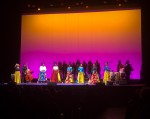African rhythms, political protest and harmonizing voices all made their mark in Royce Hall on Friday evening.
The Center for the Art of Performance at UCLA welcomed Sweet Honey In The Rock, a female singing ensemble accompanied by light instrumentation, for the group’s 45th anniversary on Friday at Royce Hall. It performed for nearly 2 1/2 hours, combining traditional African chants with 20th-century gospel and more modern compositions. The ensemble was composed of six singers, a percussionist, a saxophonist and a bassist. The group transitioned from song to song, often breaking to speak with the audience about topics like civil rights, gun violence and climate change through speeches, dialogues and poetry.
“There were stories that tied the songs together,” said Britt Warner, an attendee of the performance. “I felt both grounded and pulled into the spiritual ether.”
Sweet Honey In The Rock is recognized not only as a musical group but also as a main player in the arena of social activism. Every song they performed had some form of political commentary woven into it, ranging from more current events such as gun violence and climate change to reflections on America’s racially divisive past.
The first half of the show focused on previous social justice movements such as the African-American civil rights movement. One of the songs bore a Ghanaian title that represented the notion of having to look back to the past in order to move forward to the future. While the women sang on stage, images of young black Americans protesting during the 20th century played on a screen behind them.
One particularly potent song repeated the word “echo,” indicating a resounding shared experience of trauma but also solidarity that can still be felt today. Simultaneously, modern paintings of African-Americans were shown in the background. The images depicted the African-American experiences of inequality, highlighting the struggles of the past through the pained expressions on their faces.
Sweet Honey In The Rock’s songs, in combination with the visuals and spoken words, are not meant to be viewed purely as entertainment, but rather as a device to relay notions of justice and equality. The performance presents social and political issues as well as spiritual beliefs in a way that feels very human, Warner said. Similarly, Madelyn Davis, a first-year theater student who attended the performance, discussed the dual nature of the performance, which provided both political rhetoric and impressive music.
“They were talking about such important issues in a way that was relatable to enormous audiences,” Davis said. “They’ve been doing this for such a long time and sharing their ideas and their voices with people for so long.”
To transition to the second half of the show, which was focused more on current issues, the ensemble performed a gospel-sounding tune concentrated on justice for all. While the lyrics discussed working toward an egalitarian ideal where all people are equal and important, the photos shown in the background juxtaposed past issues like civil rights with more current issues such as kneeling during the national anthem, as well as global concerns like the Israel-Palestine conflict.
One of the performances involved stripped-down instrumentation and simple harmonies as the names of those killed through gun violence and instances of mass violence were spoken. Incidents like those of Emmett Till, Trayvon Martin, Columbine and Virginia Tech were written on index cards and read aloud, each dropped into one of the singers’ scarves and placed on the floor.
“When she started naming the names of the people, that really grabbed me – especially when they said Emmett Till because I actually went to his funeral as a child,” said attendee Linda A. Smith.
One of the singers, Louise Robinson, then picked up her scarf and held it to her heart, proceeding across the stage as if she were in a funeral march. The light changed from a bright blue to a deep orange and only her outline could be seen, perhaps indicating the universal nature of gun violence, and how it touches nearly everyone.
The end of the performance saw a more personal moment, with each of the original members delivering a short speech before presenting a solo song. One of the group members, Carol Maillard, sang about dreams she had of her son playing the violin. Another member, Aisha Kahlil, delivered a passionate poem before using tribal rhythms and sounds in a colorful melody.
The finale was a grand event with bright colors lighting the background and the whole choir added their voices to the performance. Putting the traditional Psalm 23 prayer, which states “The Lord is my shepherd,” to music in a modern way, the performance ended on a positive and hopeful note.
“I laughed. I cried. I learned,” Davis said.
